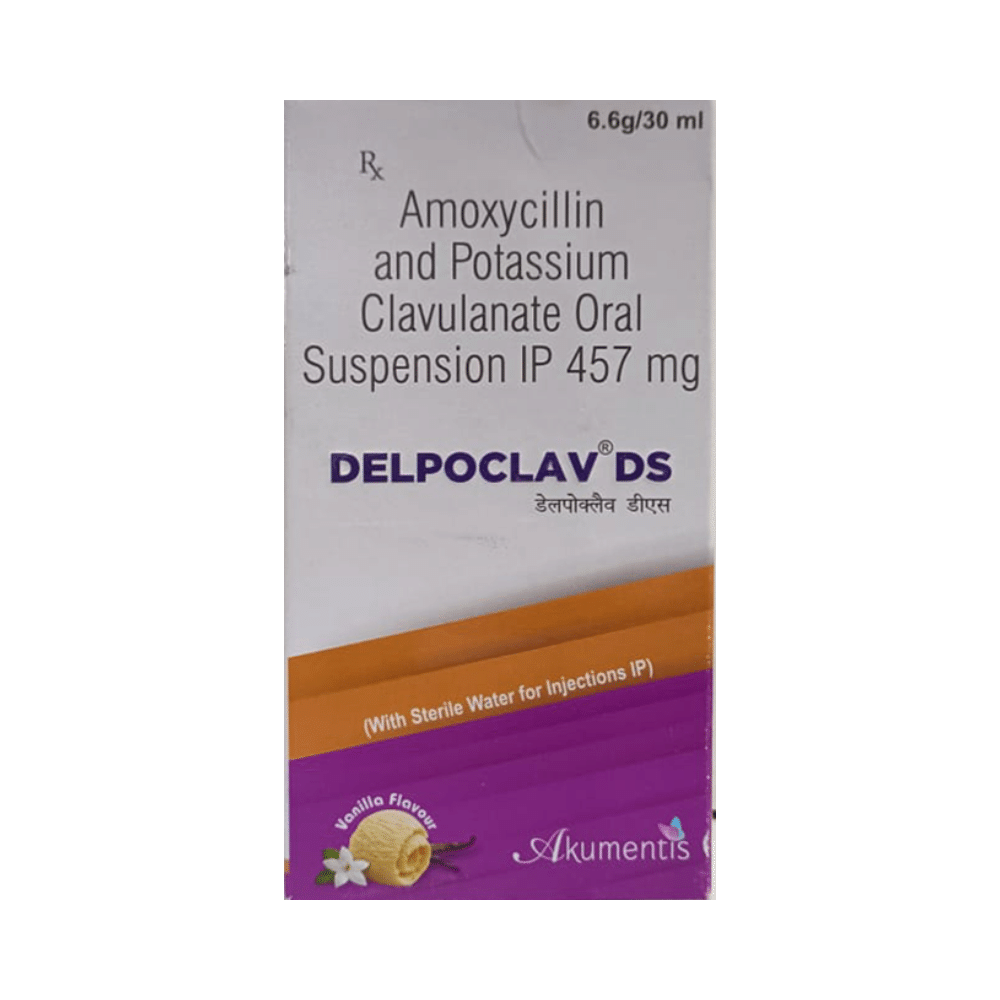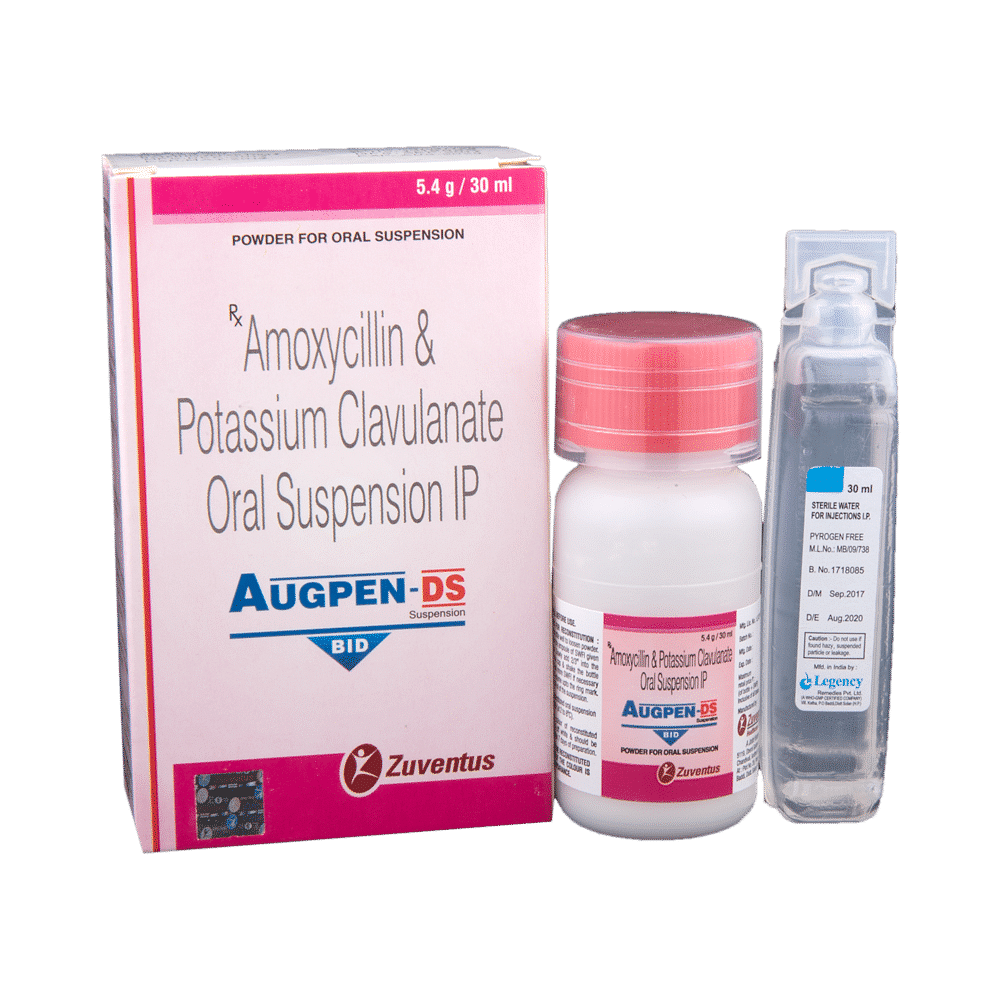
Moxclav BD DS 457mg Suspension
Manufacturer
Sun Pharmaceutical Industries Ltd
Salt Composition
Amoxycillin (400mg/5ml) + Clavulanic Acid (57mg/5ml)
Key Information
Short Description
Moxclav BD DS 457mg Suspension is an antibiotic medicine that helps treat bacterial infections of the ear, nose, throat, chest, lungs, teeth, skin, and urinary tract.
Dosage Form
Suspension
Introduction
Moxclav BD DS 457mg Suspension is an antibiotic medicine that helps treat bacterial infections of the ear, nose, throat, chest, lungs, teeth, skin, and urinary tract. It is capable of killing bacteria that have become resistant to other therapies and thus also helps treat tuberculosis that is resistant to other treatments.
Directions for Use
Never give Moxclav BD DS 457mg Suspension until and unless prescribed by the doctor. You must also never share your child’s medicine with anyone else even if they show similar symptoms.
Safety Information
Side Effects
No common side effects listed.
How it works
Moxclav BD DS 457mg Suspension is an antibiotic. It has two active agents amoxycillin and clavulanic acid. Amoxycillin works by preventing the formation of the bacterial protective covering (cell wall) essential for the survival of the bacteria. Whereas clavulanic acid serves a special purpose of inhibiting an enzyme (beta-lactamase) that is produced by resistant bacteria. This makes the combination of amoxycillin and clavulanic acid an effective line of treatment for many types of infections.
Quick Tips
Never give Moxclav BD DS 457mg Suspension to treat common cold and flu-like symptoms caused by viruses. Never save medicine for future illnesses. It cannot be said whether the same medicine will work on future infections. Check ‘expiry’ before giving Moxclav BD DS 457mg Suspension to your child. Immediately discard all the expired medicines. Stop Moxclav BD DS 457mg Suspension immediately if your child develops an itchy rash facial swelling or breathing difficulty. Report to the doctor without any delay.
Related Medicines

Princiclav Suspension

Rzcv Forte Suspension

Delpoclav DS Suspension Vanilla

Augpen -DS Suspension

Addclav Forte Suspension

Zoxil CV 400mg/5ml/57mg/5ml Suspension

Delpoclav DS Suspension
Frequently asked questions
Can other medications be given at the same time as Moxclav BD DS 457mg Suspension?
It is important to inform your child's doctor about any other medications they are taking before starting Moxclav BD DS 457mg Suspension. Additionally, always check with your child’s doctor before administering any medication to your child.
Can I get my child vaccinated while on treatment with Moxclav BD DS 457mg Suspension?
Generally, antibiotics do not interfere with the ingredients in vaccines or cause adverse reactions in children after vaccination. However, before administering any medication to your child, it is essential to consult with their doctor. It is recommended to wait until your child recovers from the illness before giving them a vaccine. Once your child feels better, you can then administer the vaccine.
Which lab tests may my child undergo while taking Moxclav BD DS 457mg Suspension long-term?
If treatment with Moxclav BD DS 457mg Suspension is prolonged, regular checks for kidney and liver function should be performed by your child's doctor.
Can I give a higher than the recommended dose of Moxclav BD DS 457mg Suspension to my child?
Giving a dose that exceeds the recommended dosage can increase the likelihood of unwanted side effects. In case your child experiences a worsening of symptoms, please contact your doctor for reevaluation.
Can I stop giving Moxclav BD DS 457mg Suspension to my child when the symptoms are relieved?
It is crucial not to stop administering this medication without consulting your doctor. This is especially important, even if your child feels better, as the medication may still provide benefits for a complete duration of treatment.
Can Moxclav BD DS 457mg Suspension cause diarrhea?
Yes, Moxclav BD DS 457mg Suspension can cause diarrhea. This is because the medicine is an antibiotic and kills harmful bacteria. Additionally, it may impact the healthy bacteria in your child's stomach, leading to diarrhea. If your child experiences diarrhea, encourage them to drink plenty of fluids or other liquids. If diarrhea persists or you notice signs of dehydration (e.g., decreased urination with dark-colored and strong-smelling urine), contact your doctor for further guidance before administering any additional medications.
Do all viral common colds result in secondary bacterial infection?
Most commonly, bacterial infections do not follow viral infections. In fact, giving antibiotics during a viral infection can increase the risk of side effects for your child. Therefore, use antibiotics only after consulting with your child's doctor.
The mucus coming out of my child’s nose is yellow-green. Is it a sign of a bacterial infection?
Yellow or green mucus in the nose does not indicate a need for antibiotics. During a common cold, it's normal for mucus to thicken and change color from clear to yellow or green. These symptoms typically last 7-10 days.
Is there any sign which shows that my child needs immediate medical attention?
You should call your child's doctor immediately if they experience severe allergic reactions (difficulty breathing, skin rashes), gastrointestinal complications (diarrhea), or liver damage (weakness, paleness, vomiting). Although rare, these side effects can be serious and require expert medical attention.


